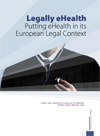 The term eHealth, although now quite current in Europe and, indeed, throughout the world, still is rather new, making its first appearances in the scientific and policy literature around 1999. Its predecessors, however, date back to the 1960s when the concepts of health informatics and bio-medical computing began to occupy the minds of academic physicists, mathematicians, and medics.
The term eHealth, although now quite current in Europe and, indeed, throughout the world, still is rather new, making its first appearances in the scientific and policy literature around 1999. Its predecessors, however, date back to the 1960s when the concepts of health informatics and bio-medical computing began to occupy the minds of academic physicists, mathematicians, and medics. The 1960s and 1970s saw the development of computing technology for mathematical modeling applied to the healthcare setting, along with highly specialized, tailor-made programmes for complex medical models. The early 1990s saw the beginnings of the IT revolution, which took us from the back roads to the super highway. With the development of Internet technology, eHealth became a potential reality not only for healthcare practitioners but for every citizen.
It was, however, not until the late 1990s that layers and administrators began to question the extent to which existing legislation was suffi cient to cover the use of eHealth tools in the provision of healthcare to citizens. Over the past decade, a number of articles, reports, and studies have established that the use of ICTs in healthcare does raise a number of legal questions, but few have looked, in detail, at the extent to which European legislation could provide good answers.
The Legally eHealth Report, therefore, seeks to examine some keys of the legal questions raised by the adoption of eHealth tools in healthcare. It looks at how EU legislation on data protection, product and services liability, and trade and competition law applies.
In considering the law of privacy, the report examines the European Directives on Data Protection Directive, Privacy in Electronic Communications, as well as the European Convention of Human Rights against the backdrop of a number of scenarios exploring data transfer for the purposes of better care provision both across European and international borders, as well as for commercial purposes.
The report also addresses the vexed issue if liability eHealth goods and services, covering both simple eCommerce-like health services transacted over Websites, as well as much more complex issues such as multiple and split liability for services provided through a series of co-operating providers is also explored. Finally, noting that eHealth is a significant, emerging European industry, the Legally eHealth report questions the extent to which European trade and competition law might apply to eHealth.
The overall objective of the report is to widen the audience of legal questions in eHealth since, until these issues are tackled head-on in real cases, we will not begin to change the legal landscape in order to provide fertile ground for new developments. eHealth is not just about technology, but about changing the everyday practice of healthcare for every healthcare professional and every patient.
Download Legally eHealth: Putting eHealth in its European Legal Context Report (.pdf, 1.293 KB).
Download from the eHealthNews.EU Portal's mirror: Legally eHealth: Putting eHealth in its European Legal Context Report (.pdf, 1.293 KB).
For further information:
ICT for Health
European Commission - Information society and Media DG
Office: BU31 06/73 B-1049 Brussels
Email: This email address is being protected from spambots. You need JavaScript enabled to view it.
Tel: +32 2 296 41 94
Fax: +32 2 296 01 81
http://europa.eu/information_society/eHealth